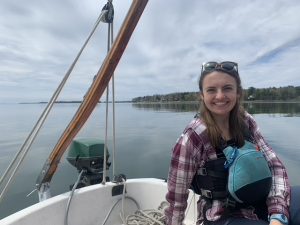Fishermen and Occupational Therapists
By Brie Weisman, Occupational Therapist
Also published by Commercial Fisheries News September 2021
FishAbility: Fishermen and Occupational Therapists
FishAbility works with fishermen who have chronic health issues or had an accident or injury, and want to continue working safely and productively. To do this, Occupational Therapists (OTs) on FishAbility staff help identify and address fishermen’s strengths and challenges to help them continue fishing. There is no cost for FishAbility services.
In general, OTs work with people facing medical conditions, from commonplace issues such as arthritis, and age-related weakness, to amputations, neurological diseases, traumatic brain injury, and spinal cord injury. OTs are health care professionals trained to analyze how individuals perform various tasks. They deconstruct tasks into gross and fine motor skills, cognitive skills, and sensory involvement to understand the individual components. Sometimes a task may be performed better by changing behavior alone and sometimes by changing a tool alone; often, the best results come from some combination of the two.
For a commercial fisherman working with FishAbility, an assessment would entail a review of the gear, boat, docks, perhaps even the clothing that a worker uses in the course of a workday. A tour of the worksite is commonplace, and allowing the OT to observe the client at work is ideal. FishAbility will then generate a report of recommendations and suggestions that will make the worker simultaneously safer, more productive, and happier on the job. These suggestions may include adaptive techniques like modifying lifting, bending, and twisting actions, incorporating low-tech equipment (reachers, grip tape, and orthotics) or high tech equipment (electronic biomechanical feedback, use of phone apps, and wheelchair lifts). Resources through which fishermen can acquire these items are included with these recommendations. These recommendations are confidential and the fisherman is under no obligation to use any of them.

Keeping it Local
Michaela Marden is completing her Masters of Occupational Therapy at the University of Southern Maine and is working as a Fieldwork Level II student for Maine AgrAbility.
What is your Job with AgrAbility?
To learn how to support people in the agriculture industries in Maine to do jobs more safely, independently, to improve efficiency and increase their own perceived job satisfaction.
What do you like the most about the program?
Working with individuals with goals that are specifically meaningful with their work in agriculture because agriculture is important to Maine.
What do you like least about the program?
That more people are not taking advantage of AgrAbility and being able to use its resources.
What is something surprising or unexpected that you’ve learned about AgrAbility?
The variety of people who use AgrAbility; different conditions, problems and concerns and, despite having a disability, how many continue on in their profession. For example, I’m teaching a blind farmer how to use an electronic guidance device on his farm so that he’s more independent in performing daily chores.
You have a small sailboat-what one item would you not want to leave on the dock? My life jacket that I use as a white water raft guide; it has everything: knife, carabiner, lots of pockets for holding sunglasses and sunscreen.
